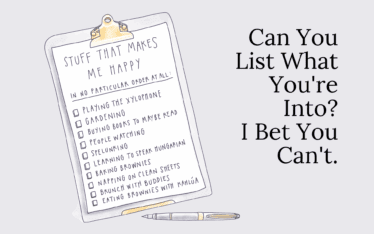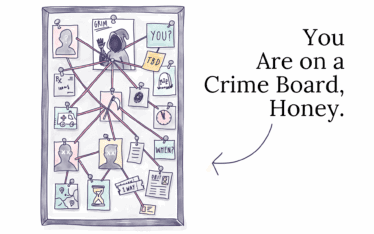 My mom had her first heart attack when she was 42 (let’s not even talk about how she DROVE 45 MINUTES BY HERSELF TO THE HOSPITAL—denial is the number one symptom of a heart attack, kids), and the year I turned that age was somewhat unsettling. I kicked the year off with great intentions to look after my own heart: Cardio! Greens! Bloodwork! More cardio! Maybe consider cholesterol medicine! More insoluble fiber! Less saturated fats! Even more cardio! Except I don’t really like cardio so I consoled myself with the notion that “I don’t smoke a pack of Du Maurier Extra Lights a day like my dear mom did so I’m probably not going to go into cardiac arrest this year so I can also probably pull the plug on the StairMaster.” Extra cheese on this girl’s nachos, please and thanks!
My mom had her first heart attack when she was 42 (let’s not even talk about how she DROVE 45 MINUTES BY HERSELF TO THE HOSPITAL—denial is the number one symptom of a heart attack, kids), and the year I turned that age was somewhat unsettling. I kicked the year off with great intentions to look after my own heart: Cardio! Greens! Bloodwork! More cardio! Maybe consider cholesterol medicine! More insoluble fiber! Less saturated fats! Even more cardio! Except I don’t really like cardio so I consoled myself with the notion that “I don’t smoke a pack of Du Maurier Extra Lights a day like my dear mom did so I’m probably not going to go into cardiac arrest this year so I can also probably pull the plug on the StairMaster.” Extra cheese on this girl’s nachos, please and thanks!
What was most bizarre about my 42nd Year of the Healthy-ish Heart was the mental activity of placing myself at my mom’s age when all that went down. I was in high school and perceived my mother to be not quite ancient, but definitely severely aged. At that time (in my distorted-and-still-developing-teenage brain) it made sense that a woman who had lived for four drawn-out decades might experience a life-threatening health issue. Old age’ll do that to you, right? So fast-forward to my own 42nd birthday, unwrapping a starkly different perspective. At 42 I felt like I was still in my early 30s (or at least still dressing like it). “Me? Having a heart attack, at this age? But I’m going to a cool concert this Friday! I’m not even using concealer under my eyes yet!” It seemed unfathomable that I was eligible not just for a heart attack, but for any kind of calamity. Naïve, sweet, ignorant me at 42. I woke up to the reality that I am not impervious to illness or injury… I am not special enough to not die.. I am so not immortal.
 My mom died at 58 and it’s a fascinating frame with which to see life through. I’m 48 so I ask myself, “What if I only had 10 years left? What’s most important to stuff into those years? How do I want to maximize this next (hypothetically last) decade? What do I need to eliminate in my life, if I want the next 10 years to be astonishingly alive?” (👈 do not say extra cheese.)
My mom died at 58 and it’s a fascinating frame with which to see life through. I’m 48 so I ask myself, “What if I only had 10 years left? What’s most important to stuff into those years? How do I want to maximize this next (hypothetically last) decade? What do I need to eliminate in my life, if I want the next 10 years to be astonishingly alive?” (👈 do not say extra cheese.)
When a person reaches the age at which one of their parents died, it can trigger a profound psychological response rooted in mortality awareness. This peculiar “mortality milestone” forces us to confront the fragility of life that much more acutely.
A gentleman at a recent workshop I led shared that his dad died at 55: “I’m 56 and I’m now choosing to live like I’ve got a countdown timer. I’m putting my phone down and really listening to my kids when they share stuff about their jobs. I’m making time for woodworking again. I’m not saving all the fun stuff for retirement, because I might not make it there. My dad had all these plans for when he retired, like he was saving his life for then. He got ripped off. I want to live now and into retirement.”
Another woman chimed in, at the same workshop: “My mom died of breast cancer when she was 37. I’m 35 now and as I approach that age, I’m living like I have something to lose.”
Reaching the “dead parent age” can prompt reflection on legacy and identity, as we compare our lives to our parent’s at the same stage. A former client used to lament that her mom had written two books when she died at 60 while she herself had only tinkered with a book proposal by 60.
Surviving beyond our parent’s age of death can feel like uncharted territory, fostering feelings of uncertainty. A friend of mine’s mom died at 63 years old. Since her grandmother also died at that age, my friend rather rationally deduced that she’d perish at 63, too. “I’m now almost a year older than that and I feel like I’m living on borrowed time.” She’s not putting her feet up in life; she’s researching and writing and about to put a major thought-leadership-dent in her industry.
Sometimes we experience a bit of survivor’s guilt when we surpass our parent’s death age. A friend of mine has questioned why he’s alive at 52 when his dad didn’t get to live past 48. He’s wondering about what responsibilities come with his “gift of extended time,” as he sees it. This milestone has become a turning point for him—an opportunity to redefine his life priorities, deepen his relationships, and reshape his narrative about mortality and meaning and “WTF am I doing with my life” (something many of us wonder about, with or without a dead parent as a prompt).
If you’ve lost a parent (sorry) and you’ve outdistanced their death-age, ask yourself if this extra time can foster a deeper appreciation for life… maybe encourage you to pursue goal that means something to you… maybe nurture the relationships that matter… and maybe savor experiences that your mom or dad didn’t have had the chance to enjoy.
And if your parent was a real (*clears throat*) piece of work, maybe this little mental exercise of contemplating the longer life you get to live becomes a time of self-actualization, marked by wisdom, gratitude, and a sense of purpose that transcends your parent’s untimely departure. “I’m going to make something of my life in a way that my dad wasn’t capable of with all his addictions,” said a former client. You get to break cycles, make choices your parent might not have been able to, and maybe just be a nicer person (who doesn’t wear socks with sandals).
And if you haven’t lost your parent(s) yet, go give them a hug. Or mail them a card. Or just go live your own life as though you’ve been warned you will not last forever… with all the cheese you can fit in.

P.S.: Don’t forget about my book, You Only Die Once: How to Make It to the End with No Regrets!
P.P.S.: Let’s do Instagram together!
P.P.P.S.: Oh and just in case you missed it… I’d love you forever if you took 16 minutes out of your life to watch my TEDx talk!






